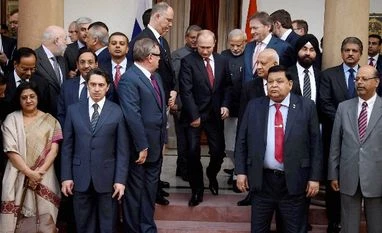“I am pleased that the first unit of the Kudankulam Nuclear Power Plant (KKNPP) is on-stream. It has added 20 per cent to the existing nuclear power capacity in India. We are on course to installing the next three units of 1,000 Mw each. Today, we have outlined an ambitious vision for nuclear energy of at least 10 more reactors. It will have the highest standards of safety in the world,” Prime Minister Narendra Modi said after a meeting with Russian President Vladimir Putin, under the 15th India-Russia Annual Summit.
He added ties in the field of energy would also entail manufacturing equipment and components in India, in line with the government’s ‘Make in India’ policy. “The second unit will go on-stream soon. We have signed a deal to construct more than 20 nuclear plants to produce nuclear fuel,” Putin said, adding talks on civil nuclear cooperation remained one of the most important aspects of the discussions.
Of the 12 nuclear reactors to be built by 2035, two will be constructed at KKNPP.
Their construction would start by 2016, according to the general framework agreement signed on construction and equipment delivery by Russian nuclear energy giant Rosatom, sources told Business Standard.
Chairman of ESSAR Shashi Ruia and President ROSNEFT, Igor Sechin exchange documents after signing an agreement at Hyderabad House in New Delhi
KKNPP’s first unit became operational in July 2013, achieving complete generation capacity by October 22, 2013. The second unit, the construction of which has been completed, is expected to go on-stream by 2015. An agreement to add two new nuclear blocks at KKNPP, located in southern Tamil Nadu, was signed in April this year.
According to another agreement signed on Thursday, India will import 10 million tonnes of oil a year from Russia, under a 10-year contract signed between Essar Oil and Russian crude oil producer Rosneft. The deal, which could be extended beyond 10 years, was signed between Essar Group Chairman Shashi Ruia and Rosneft chief Igor Ivanovich Sechin.
This was one of the 20 agreements signed between the two countries on Thursday.
In the field of defence, both governments left no stone unturned to reaffirm their partnership. Russia contributes about 70 per cent to India’s total military hardware. “Russia has been India's foremost defence partners through decades … Even as India’s options have increased today, Russia will remain our most important defence partner,” Modi said.
He added Russia had agreed to fully manufacture one of its most advanced helicopters in India, which could be used for military, as well as civilian operations. It has been planned these helicopters will also be exported from India.
Both sides also agreed to push some pending defence projects such as the development of a joint fifth-generation fighter jet and a multi-role transport aircraft.
Earlier, Russia had expressed concern on India's increasing defence purchases from Israel and the US, while the Indian government was unhappy at the fact that Russia had entered into a far-reaching defence agreement with Pakistan, under which it had started supplying Mi-35 helicopters to combat terrorism.
In the wake of severe trade sanctions imposed by the US and the European Union on Russia, the Kremlin hopes India will be a major buyer of its crude oil and nuclear fuel. Russia also plans to ramp up its merchandise trade with India, currently at $10 billion. Both governments plan to double this by 2015.
“The bilateral trade of $10 billion is not enough. We have decided to stimulate our companies to cooperate more closely in increasing trade and investment,” said Putin, on a 24-hour visit here. He added talks on a free trade agreement with the Eurasian Economic Union, comprising Russia, Kazakhstan and Belarus, would be launched soon.
Both sides hailed the progress in promoting diamond trade between them, with a special focus on augmenting it through diamond exchanges in India. Russia has decided to significantly increase its diamond exports to India.
Later in the day, Modi and Putin jointly inaugurated the World Diamond Conference here.
DRUZHBA-DOSTI
- Russia's Rosatom to build 12 new nuclear reactors in India
- Two of these new reactors will be set up at the Kudankulam Nuclear Power Plant, while the location for the rest is yet to be decided
- Essar Oil and Rosneft signed a 10-year contract under which India will import 10mtpa oil. Contract can be extended beyond 10 years
- Rosneft and ONGC Videsh to complete talks on exploration of new oil and gas fields
- Proposal to build a hydrocarbon pipeline connecting India and Russia also discussed
- Russia to manufacture its advanced helicopters here; Plans to also export those from here
- Russia to significantly increase its diamond export to India
- India, Russia vowed to achieved bilateral trade worth $20 billion by 2015
- Proposal to establish free trade agreement with Eurasian Union also discussed
- Russia expressed interest to invest in the Delhi-Mumbai Industrial Corridor and the Smart City project
)